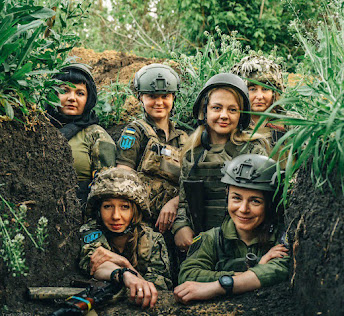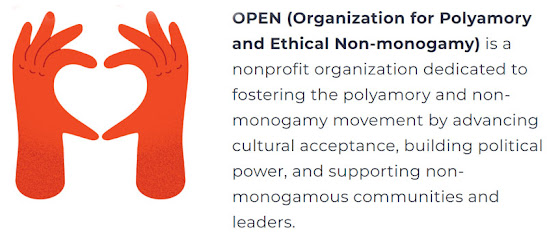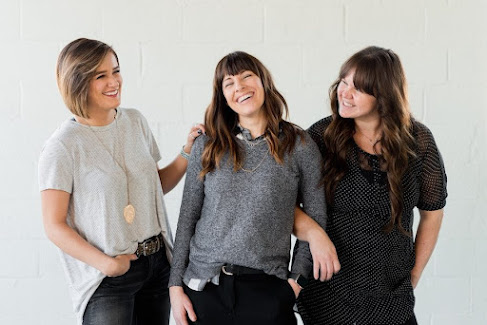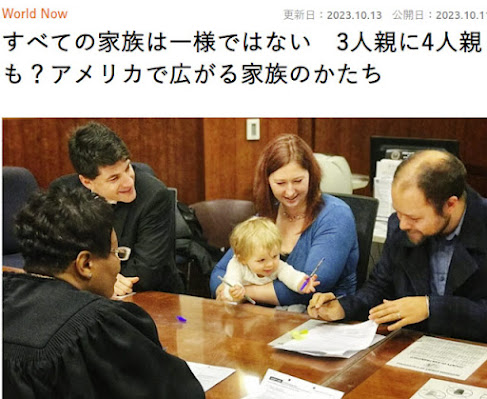New Poly/CNM activist group revs up. Better mainstream-media advice for throuples. Being poly in a backwater. Being an exploitation-free unicorn. And more.
Action Alerts!
- (US only): The Kids Online Safety Act (KOSA) is gaining momentum in Congress, and we must act swiftly to protect our online freedom. KOSA threatens to create digital censorship and restrict internet access. Join us in taking a stand against this bad internet bill by contacting your Senators now and urging them to say "NO" to KOSA. Click here to take action via our friends at the Woodhull Freedom Foundation.
- Earlier this month, we raised the alarm when Meta's new AI "practical dating coach" chatbot spouted harmful myths and stigma around non-monogamous relationships. Although Meta quietly updated the bot, their meager fix doesn't go nearly far enough. We've had enough of companies like Meta erasing non-monogamous families and relationships. Add your name to our letter to Mark Zuckerberg and Meta!
Resources Galore!
- Our free, monthly Peer Support circles continue on the second and third Tuesday of November! RSVP for the Support Circle on Friday Nov. 14 or the New To Non-monogamy Support Circle on Tuesday, Nov. 21.
- Not all media portrayals of non-monogamous relationships are created equal. OPEN's NEW Non-monogamy Media Guide presents a set of questions to help writers, readers, and viewers assess the intent and impact of depictions of non-monogamy in the media. Check it out on our blog or on Instagram, Threads, or Twitter.
- Want to help promote awareness and understanding – and grow the movement for rights and acceptance – at your event or venue? We published two new printable brochures that provide key facts and talking points about non-monogamy and the growing movement. Click here to download the files to print at home or request printed copies by mail (US only)!
Volunteer Opportunity!
Looking to get more involved with OPEN's mission? We're looking for a few volunteers to help build OPEN's media list in support of our earned media strategy. This project involves online research and can be worked on asynchronously / independently. Click here to learn more about this volunteer project and get involved!
One more thing...
As we look ahead to 2024, we're working to grow our team and deepen our impact – but we can't do that without your support. Here's how you can help support our work:
- Make a donation online or set up a recurring monthly contribution. If you have employer matching, you can look up OPEN on Benevity to double your gift (EIN 88-1151856).
- Start a social media fundraiser for OPEN on Facebook or Instagram! To make it easy, we published a step-by-step guide with images, descriptions, and more. Tag @openloveorg so we can signal boost you!
- Shop OPEN's Non-monogamy Nonfiction reading list! Your order will be fulfilled by a local independent bookstore, and OPEN gets a cut.
As always, thank you for being part of the movement for a more open and inclusive world!
With love,
Brett Chamberlin, Executive Director
OPEN recently held an online seminar of experts about fighting workplace discrimination and creating ENM-friendly employee policies. Watch the recording. OPEN plans to publish a workplace activists' guide drawing in part on material from this event.
Have you ever questioned why romantic relationships are often given higher priority than friendship? Are you someone who treats all your relationships equally and don’t believe in putting one above the rest? Better yet, are you all about rejecting labels and norms and forming relationships based on personal needs versus societal expectations? Then relationship anarchy (RA) might be for you.“Relationship anarchy is an approach that rejects pre-defined relationship structures and, specifically, hierarchies, allowing individuals to define their connections [on their own terms],” says Jesse Kahn, LCSW.... “This means that labels, rules, and expectations are not assumed and are instead discussed and agreed upon.”...TL;DR: If you take the definition of “anarchy,” meaning “having no ruler,” and apply it to romantic and platonic connections, then relationship anarchy could be defined as a bond with no rigid rules....There are many reasons why people might choose to practice relationship anarchy, from wanting more personal freedom in relationships to rejecting societal expectations for how certain bonds should progress, according to the experts....Put simply, relationship anarchy is a relationship style that rejects learned structures and hierarchies for all types of bonds. It’s “a philosophy for loving that encourages people to build creative and unique relationships based on the needs and desires of the individuals involved,” rather than societal beliefs, explains relationship anarchist and therapist Anna Dow, LMFT.It’s also an intentional way of co-creating connections, allowing people and those they’re in relationships with to choose what works for them, says [Jesse] Kahn. This could entail selecting from a smorgasbord of various relationship arrangements and behaviors (more on that later). ......[Liz] Powell says. “If it’s really difficult to wrap your head around the idea of not having those distinctions, then do some additional reading, explore the concept in more depth, just to expand your own way of looking at things,” before ruling RA out.At the same time, it’s okay if relationship anarchy isn’t for you. There’s a debate within non-monogamous communities about whether it’s better or worse to practice RA....
By Mark TraversFalling in love with two people at once is a genuine and profound experience for many. It’s not merely about divided affection; it’s about an expansive capability to care, connect and commit to more than one person. ...Here are two conversations that can help throuples smooth out the kinks in what can be a potentially unstable dynamic.1. The “Are We Ready To Do This” ConversationSelf-awareness. How well do you know your own boundaries, needs and triggers? ...Past relationship dynamics. What did you learn from them, and how can those lessons inform the dynamics of the throuple? ...Financial compatibility. How do you envision sharing financial responsibilities? Will the financial contribution be even, or based on individual contribution? ...Cultural and societal concerns. Given the non-traditional nature of throuples, are you prepared to face potential societal biases or prejudices? How will you handle questions or critiques from family, friends and strangers? ...2. The Regular “Check-In”Emotional well-being. Are the emotional needs or concerns of each partner addressed? ...Time management. How are all three partners ensuring that they get quality time both individually and collectively? Are any adjustments needed? ...
Boundaries. Are the established boundaries still working? Do they need revisiting or adjusting? ...Future planning. Throuples need to consider their future — living arrangements, financial plans or even family planning if that’s on the table. ...When it comes to making a throuple work, the foundation lies in trust, understanding and respect. While open conversations about your expectations and goals are important in any relationship, conversations about the whats, whys and hows become especially important in non-traditional arrangements. ... Recognizing that change is constant and being willing to navigate it together is crucial.Mark Travers, Ph.D., is an American psychologist with degrees from Cornell University and the University of Colorado Boulder. ...
I love being in a throuple —we share a king-sized bed but no jealousy

"Girlfriends Amber, Kenzie and Legacy regularly face social media
backlash for being an all-female throuple. TikTok / @amourdetrois"
By Asia Grace...And since welcoming girlfriend Amber, whom the couple met on a dating app, into their polyamorous fold, the all-female throuple has endured crashing waves of vitriol from virtual haters saying, “This will end badly” and “You’re going to hell.”But rather than becoming defeated by digital digs, the ménage à trois has taken a trendy approach to shutting down trolls.“First off, b- – -h mind your business,” sang the lovebirds in a popular TikTok post dedicated to their detractors.In the clap-back clip, which scared up over 1.8 million views, Kenzie, 23, Amber, 26, and Legacy, 26 — based in Raleigh, North Carolina — responded to critics who’ve said, “You can’t be in love with two people.” The poly paramours titled the video “Throuple life” and stamped it with #Throuple, [a hashtag that] has amassed over 1.4 billion TikTok views.
By Katie Baskerville...Polyamory is one branch of the ENM tree....So, what does being polyamorous actually mean? Poppy Scarlett, a pleasure educator and content creator based in London... explains: “In its simplest form, it’s having the capacity or the desire to love multiple people at the same time. But what that really means to me is about living authentically and allowing relationships, regardless of whether they’re sexual or romantic or platonic, to take whatever shape feels natural rather than forcing it into a specific box.”...Alex started questioning monogamy and exploring relationship styles when the world was disrupted by Covid-19. ... For him, polyamory is about having the freedom to “just have a relationship that I want and the rules that I want around it without shame”.For London-based Abigail Hardingham, finding polyamory proved to them how flexible humans can be. They tell me: ”We can rewire the way we think. That you can choose to live a lifestyle that doesn’t fit what is prescribed to us from a young age. It means creating a queerer more communal way of living.”Michael Munro, from Brighton, praises polyamory for teaching him about personal growth and the rejection of traditional relationship norms. “It’s a way of recognising the complexity of human emotions and relationships while prioritising honesty and respect in all connections,” he says. ...
An ongoing study by YouGov suggests that polyamory isn’t on the cards for most [British] folk. ... As of August 2023, the data shows that most people have never heard of polyamory and therefore wouldn’t be “open” to it. However, younger age groups seem to be more receptive to the idea, with 12% of 18-25 and 10% of 25-49-year-olds saying they haven’t heard of it but would give it a go.
By Amanda Waltz...Rogers explains that, beyond the romantic aspect, practicing non-monogamy has added a level of security to her and her partners’ lives. This ranges from supporting each other financially to sharing household duties like preparing meals. It even extends to pet care.“My one partner just got a dog, which has been their lifelong dream,” she says. “But it was just a lot of change really fast of, okay, we're going to pick this little guy up and we got to get all this stuff. And they were just like, wow, really glad to have an extra set of hands.”

Melissa Rogers, John Kowalski, and Hana Jimenez pose for a portrait at Soergel Orchards. CP Photo: Mars Johnson
...How to be in a healthy, happy throuple relationship:1. Learn about polyamory...2. Acknowledge that there are *four* relationships at play in a throuple...3. Talk about “worst-case scenarios”...4. Prioritize equity over equality...5. Have regular check-ins...6. Learn how to communicate in relationship...
Focus not on monogamy, but on how to care for others ethically in relationship.
"A 2021 study found that nearly 17 percent of [single people in the US] would like to engage in polyamory, and nearly 11 percent have done so during their life." (Adam Winger photo) If you have had a reason to be on a dating app recently, you may have noticed phrases like “poly and partnered” or “solo poly” on profiles. This is a relationship style that is growing in popularity in Canada, and I have not seen our churches speak to it....I and other ministers connected with the non-monogamous community want to see the church speak to the Gospel into these not-so-new forms of relationships. If the church desires to be relevant, then it needs to start talking about polyamory.Jesus, in my mind, would have had plenty to say on this subject, as so much of his ministry focused on living ethically within community. His annoyance at his listeners’ fixation on sexuality, such as with the woman accused of adultery in John 7:53–8:11 or his teachings on divorce in Matthew 19, show his concern is less with upholding monogamous principles and more so on living justly....I want to see a conversation about non-monogamy that asks important questions about what it means to live a sexually and romantically ethical life, knowing full well that if we refuse to be a part of the conversation, we will be missing out on an important moment in our cultural formation.The new call of the United Church is deep spirituality, bold discipleship, daring justice. We envision a church that has much to say on the subject of ethical living, one that engages in courageous conversations about what a faithful life of service to Christ might look like.Is there a place, then, for polyamorous Christians to share their experiences and wisdom with us? Their struggles and hopes? Might we make space for members and their partners in our communities? What could these members teach us about ethical communal living and respectful relationships?The conversation is just beginning. ...
Signing up for three-parenthood before a judge In the United States, there are states that allow three adults to have equal custody of a child. How widespread is the "three-person parent'' trend? How have families changed and what will they become? We spoke to Diana Adams, a lawyer and founder of the Chosen Family Law Center (New York), a nonprofit organization that promotes family diversity. (Interviewer: Saori Honma)----------------------Three-parent custody is legal in at least 10 states, including California, Washington, and Maine. In fact, there are probably more places that acknowledge it informally.Since starting my law firm in 2007, I have helped thousands of families. We create co-parenting agreements for families with three or four parents. We act as mediators for families across the country, helping them reach agreements on financial burdens and co-parenting arrangements....Many researchers have found that it doesn't matter what [an adult family] makeup is, as long as there is stability and love. Courts' recognition has also changed to the point that a legal parent-child relationship is more important than a biological connection, and that it is better not to deprive children of their parents....In fact, raising children requires a lot of support. It's reassuring to have more adults who love and do everything for you like my parents did. It is also good for children to have more adults to spend time with without getting tired. Parents can also raise their children without feeling exhausted. From now on, I think the number of parents will increase from 3 to 4 or 5. ...
 |
| Naoya (top), Saki, Nagisa, and friend |
...“Girlfriend, Girlfriend,” or simply “KanoKano,” is a Japanese romantic comedy manga created by Hiroyuki.... The story revolves around a high school student involved in a polyamorous relationship with his childhood friend and another girl who confessed her feelings for him....[Saki and Nagisa] choose to live with Naoya since his parents have to live somewhere else for work. The show is mostly about their daily lives at school and the problems and difficulties they face as they deal with their unique love triangle relationship.
This workshop will explore: the advantages of polyamorous families for kids and adults; the primary findings from the 25+ year Longitudnial Polyamorous Family Study; talking to children about polyamory; co-parenting with multiple adults; and managing family interactions with a mononormative social world. Participants will have a chance to ask questions afterwards, and the recording will be available if you want to check it out but can’t make it to the live workshop.

|
|
One couple, many hands. "A new mural
painting in Kyiv dedicated to Ukrainian volunteers. If you have helped Ukrainians during this year and a half, you may consider yourself to be one of them." |
Here was a country with a tragic history that had at last begun to build, with great effort, a better society. What made Ukraine different from any other country I had ever seen—certainly from my own—was its spirit of constant self-improvement, which included frank self-criticism. For example, there’s no cult of Volodymyr Zelensky in Ukraine—a number of Ukrainians told me that he had made mistakes, that they’d vote against him after the war was won. Maxim Prykupenko, a hospital director in Lviv, called Ukraine “a free country aspiring to be better all the time.” The Russians, he added, “are destroying a beautiful country for no logical reason to do it. Maybe they are destroying us just because we have a better life.”

|
|
Ukraine's LGBT military unicorn. The thorns and barbed wire represent old restrictions now being cut away. |

|
|
Women fighters in a trench in the
Donetsk region |
Labels: #OPEN, #Poly101, #PolyamoryintheNews, #PolyAndChristian, #PolyintheMedia, #PolyNews, #PolyNormalization, #throuples, Japan, poly101, relationship anarchy, religion/spirituality, tabloids





0 Comments:
Post a Comment
<< Home